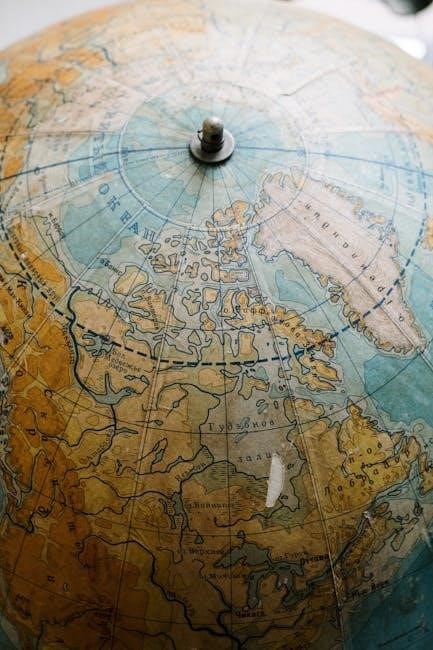This book explores how six beverages—beer, wine, spirits, coffee, tea, and cola—have shaped human history, linking them to major events and cultural transformations across centuries.
Overview of the Book’s Concept
The book “A History of the World in Six Glasses” presents a unique perspective on global history by focusing on six beverages: beer, wine, spirits, coffee, tea, and cola. Each drink represents a distinct era, from ancient civilizations to modern times. The author explores how these beverages influenced cultural, social, and economic developments, shaping the course of human history. By linking drinks to pivotal events, the book reveals how they served as catalysts for transformation, whether through trade, colonization, or technological advancements. This approach offers a fresh lens to understand the interconnectedness of global history and the role of everyday commodities in shaping societies.
The Significance of Six Beverages in World History
The six beverages—beer, wine, spirits, coffee, tea, and cola—hold profound significance in world history, each marking a distinct chapter in human development. Beer and wine played roles in ancient civilizations, fostering agriculture and trade, while spirits influenced exploration and colonization. Coffee and tea became central to intellectual and cultural movements, shaping modern societies. Cola symbolizes globalization and consumer culture. These drinks not only quenched thirst but also drove economic systems, sparked revolutions, and connected distant cultures. Their stories reveal how ordinary commodities can have extraordinary impacts, illustrating the intricate web of human history through the lens of everyday beverages.
Linking Beverages to Major Historical Events

From the rise of civilizations to modern globalization, beverages have played pivotal roles in shaping pivotal historical moments. Beer and wine were central to ancient cultures, driving agriculture and trade in Mesopotamia and the Mediterranean. Spirits fueled exploration and colonization, while coffee sparked Enlightenment ideas and revolutions. Tea became a cornerstone of the British Empire, shaping global trade and culture. Cola, meanwhile, emerged as a symbol of American influence and consumerism. Each drink not only reflected its era but also actively shaped the course of history, illustrating how everyday beverages have been catalysts for profound societal and economic transformations across centuries.

The Six Beverages: An Overview
Beer, wine, spirits, coffee, tea, and cola each represent distinct eras in world history, shaping culture, trade, and innovation across civilizations and centuries uniquely and profoundly.
Beer: The Drink of Ancient Civilizations
Beer emerged in ancient Mesopotamia, where barley and emmer wheat were fermented to create a nutritious, intoxicating drink. It became central to daily life, religion, and social rituals, with evidence of its significance found in ancient Sumerian texts and artifacts. In Egypt, beer was a staple for both the elite and laborers, often used as currency and offered to gods. Its production advanced agriculture and trade, while its consumption fostered community bonds. Beer’s role in early civilization highlights its cultural and economic importance, shaping societies and laying the groundwork for future advancements in food production and social organization.
Wine: The Beverage of Ancient Greece and Rome
Wine played a central role in ancient Greek and Roman cultures, serving as a symbol of wealth, religion, and intellectual pursuits. In Greece, wine was associated with Dionysus, the god of festivities, and was central to symposia, where philosophy and politics were debated. The Romans adopted Greek winemaking techniques, spreading viticulture across their empire. Wine became a staple in Roman life, used for both pleasure and medicinal purposes. Its trade facilitated economic connections across the Mediterranean, while its consumption reinforced social hierarchies, as access to fine wines was a marker of status. Wine’s influence extended beyond drink, shaping culture, religion, and trade in antiquity.
Spirits: The Rise of Distillation and Trade
The rise of spirits marked a significant shift in global history, driven by the invention of distillation. This process, first mastered by ancient alchemists and later refined by Arab scientists, allowed for the creation of potent, shelf-stable beverages. Spirits became a cornerstone of trade during the medieval and early modern periods, with products like rum and brandy emerging as valuable commodities. Their production and exchange shaped economies, fostering colonization and the expansion of maritime trade networks. Spirits also served as currency in some regions and were integral to cultural and social rituals, cementing their role as a transformative force in world history.
Coffee: The Spark of the Enlightenment
Coffee emerged as a transformative force during the Enlightenment, fueling intellectual and cultural shifts across Europe. The rise of coffeehouses in 17th- and 18th-century cities like London, Paris, and Vienna created vibrant hubs for debate and innovation. These spaces fostered the exchange of ideas among thinkers, scientists, and philosophers, such as Voltaire and Rousseau, who shaped modern thought. Coffee’s stimulating effects and its association with sobriety contrasted sharply with alcohol’s intoxicating influence, aligning it with the Enlightenment’s emphasis on reason and progress. By fostering collaboration and free discourse, coffee played a pivotal role in laying the groundwork for revolutionary ideas that reshaped society and politics.
Tea: The Fuel of the British Empire
Tea became the cornerstone of the British Empire’s growth and identity, shaping its economy, politics, and culture. The East India Company’s dominance in the tea trade fueled British expansion in Asia, particularly in India and China. Tea’s popularity in Britain soared, becoming a symbol of national identity and a staple in daily life. The Boston Tea Party, a pivotal event in American history, highlighted tea’s political significance. Beyond commerce, tea influenced social rituals, such as afternoon tea, which reinforced class distinctions and cultural norms; Its impact extended to global trade networks, solidifying Britain’s role as a colonial power and leaving a lasting legacy in modern globalization.
Cola: The Symbol of Modern Globalization
Cola, particularly Coca-Cola, emerged as a symbol of modern globalization, representing the spread of American culture and consumerism worldwide. Invented in the late 19th century, cola became a global phenomenon, transcending cultural boundaries and uniting people through its universal appeal. Its mass production and innovative marketing strategies transformed it into a cultural icon, reflecting the homogenization of tastes in a globalized world. Cola’s rise paralleled the expansion of multinational corporations, illustrating the power of branding and consumerism. Today, cola stands as a testament to globalization’s impact on culture, economy, and identity, connecting diverse societies through a shared beverage experience.

Beer: The Dawn of Civilization
Beer’s discovery in ancient Mesopotamia marked the beginning of civilization, fostering agriculture, social structures, and cultural practices that shaped early societies and their religious beliefs.
The Discovery of Beer in Mesopotamia
The discovery of beer in Mesopotamia around 4000 BCE marked a pivotal moment in human history. Archaeological evidence suggests that fermented barley drinks were first created accidentally when wild yeast interacted with stored grains. The Sumerians revered beer as a gift from the goddess Ninkasi, even inscribing one of the earliest known recipes in the “Hymn to Ninkasi.” Beer became central to Mesopotamian culture, serving as a staple in diets, a form of currency, and a symbol of community and celebration. Its production also influenced the development of writing, as records of beer production were among the earliest written documents.
Beer in Ancient Egypt: Religion and Daily Life
Beer played a central role in ancient Egyptian society, both as a dietary staple and a religious offering. Egyptians believed beer was a gift from the gods, with Osiris often credited as its creator. It was consumed by all social classes, from workers to pharaohs, and was even used as currency for laborers building monumental structures. Beer was also used in religious rituals, offered to deities and the dead to ensure safe passage to the afterlife. Its production was refined, using emmer wheat and dates, resulting in a cloudy, sweet beverage. Beer’s importance extended to medicine and celebrations, cementing its status as a cornerstone of Egyptian culture and daily life.
Beer’s Role in the Development of Agriculture
Beer’s emergence was deeply intertwined with the rise of agriculture, as its production relied on cultivated grains like barley. The need for a stable food supply drove early societies to domesticate plants, with beer serving as both a motivation and a reward for agricultural labor. The surplus of grains from farming enabled the production of beer on a larger scale, which in turn supported growing populations and the development of settled communities. Beer also played a role in the organization of labor, as its distribution was often used to compensate workers. This connection between agriculture and beer helped lay the foundation for the rise of complex societies and civilizations.

Wine: The Drink of the Gods
Wine, revered in ancient cultures, played a central role in religion, rituals, and trade, shaping the cultural and economic fabric of civilizations like Greece and Rome.
Wine in Ancient Greece: Culture and Philosophy
In ancient Greece, wine was a cornerstone of culture, religion, and intellectual life. It was central to symposiums, where elite men gathered to debate, recite poetry, and engage in philosophical discourse. Wine was believed to inspire creativity and foster camaraderie, becoming a symbol of refinement and sophistication. The god Dionysus, associated with wine, was celebrated in festivals that promoted social bonding and spiritual release. Greek philosophers like Plato and Aristotle often debated under its influence, linking wine to the pursuit of wisdom. This cultural reverence for wine not only shaped Greek society but also left a lasting legacy in Western civilization, emphasizing its role in both pleasure and intellectual growth.
Wine in the Roman Empire: Expansion and Trade
Wine played a pivotal role in the Roman Empire’s expansion and trade networks. The Romans adopted and refined winemaking techniques from the Greeks, spreading viticulture across their vast territories. Wine became a staple in Roman commerce, with extensive trade routes established to supply it throughout the empire. Roman engineering, such as roads and aqueducts, facilitated the transport of wine, making it a lucrative commodity. The empire’s conquests often prioritized regions suitable for grape cultivation, ensuring a steady supply. Wine not only fueled Roman culture and festivals but also served as a tool for economic and political influence, strengthening the empire’s grip over its territories.
Wine’s Impact on Religion and Social Hierarchies
Wine deeply influenced both religion and social structures in ancient societies. In Greek and Roman cultures, wine was often associated with gods, such as Dionysus and Bacchus, becoming central to religious rituals and festivals. Its use in ceremonies symbolized divine connection and communal bonding. Socially, wine consumption reinforced hierarchies, as access to high-quality wine was a marker of wealth and status. The elite indulged in refined vintages, while the lower classes drank simpler, less expensive wines. Wine also played a role in shaping gender roles, as its consumption was often restricted to men in public settings. This duality of spirituality and social division underscores wine’s profound impact on ancient cultures.

Spirits: The Age of Exploration and Colonization
Spirits played a pivotal role during the Age of Exploration, facilitating trade, cultural exchange, and colonial expansion. They were used as currency, fostering alliances and conflicts, while also fueling the triangular trade, connecting Europe, Africa, and the Americas in a complex web of commerce and exploitation.
The Invention of Distillation and Its Spread
Distillation, a transformative technique, emerged around 1000 AD in the Middle East, revolutionizing the production of alcoholic beverages; This method allowed for the creation of stronger spirits, which quickly gained popularity across various cultures. By the Middle Ages, distillation spread to Europe, particularly in Italy and Germany, where monks and alchemists refined the process. The invention of the alembic, an early distillation apparatus, facilitated this spread. Distillation not only enhanced the potency of beverages but also had medical applications, becoming a cornerstone of both culinary and scientific advancements. Its widespread adoption laid the groundwork for the global spirit trade, deeply influencing economies and societies during the Age of Exploration. This innovation marked a significant shift in how alcohol was produced and consumed, shaping cultural and commercial landscapes for centuries to come.
Spirits in the Colonial Period: Trade and Conflict
Spirits became a pivotal commodity during the colonial period, driving global trade and fueling conflict. European powers like Britain, Spain, and Portugal traded spirits for resources and labor, particularly in the Americas and Africa. The triangular trade system often involved spirits exchanged for enslaved people, sugar, and raw materials. This commerce not only enriched colonial economies but also sparked tensions, as local industries were disrupted by imported spirits. Resistance from indigenous populations and rival colonies further complicated the spirits trade. By the 18th century, spirits had become a symbol of colonial power and exploitation, shaping the economic and social dynamics of empires. Their impact endured long after colonial rule ended, leaving lasting legacies in global trade and cultural practices.
The Role of Spirits in Shaping Global Economies
Spirits played a transformative role in shaping global economies, particularly during the Age of Exploration and beyond. The rise of distillation enabled mass production, creating lucrative industries in Europe and the Americas. Spirits became a key commodity in international trade, with rum, for instance, driving the triangular trade system. They also fueled the growth of ports and merchant classes, stimulating economic activity. Additionally, spirits were used as currency in some regions, facilitating transactions and influencing monetary systems. Their production and trade contributed to the rise of capitalism, while taxes on spirits became a vital source of government revenue, further embedding them in economic structures. Spirits thus became a cornerstone of global economic development, linking trade, industry, and power across continents.

Coffee: The Catalyst for Revolution
Coffee ignited revolutions by fueling intellectual and political movements, transforming coffeehouses into hubs for radical ideas that reshaped societies and governments globally.
The Origins of Coffee in Ethiopia and Arabia
Coffee’s journey began in Ethiopia, where legend traces its discovery to a goatherd named Kaldi, who noticed the energizing effects of red coffee cherries on his goats. From there, coffee spread to the Arabian Peninsula, where it became central to Sufi religious rituals and social gatherings. By the 15th century, Arabia, particularly present-day Yemen, emerged as a hub for coffee cultivation and trade, with the port city of Mocha becoming synonymous with high-quality coffee. The stimulating beverage quickly gained popularity, not only for its flavor but also for its ability to enhance mental clarity and foster intellectual exchange, laying the foundation for its global impact.
Coffeehouses as Centers of Intellectual Revolution
Coffeehouses emerged in the 17th and 18th centuries as vibrant hubs of intellectual and cultural exchange. These establishments became spaces where thinkers, scientists, and philosophers gathered to debate ideas, fostering an environment of open dialogue and innovation. Unlike taverns, which were dominated by alcohol, coffeehouses promoted clarity of thought and lively discussions. They played a pivotal role in the Scientific Revolution and the Enlightenment, serving as incubators for revolutionary ideas. The rise of coffeehouses also coincided with the spread of newspapers, further fueling the exchange of knowledge. These gatherings laid the groundwork for modern democracy and the concept of free thought, transforming society and culture forever.
Coffee’s Role in the Enlightenment and Modernity
Coffee played a pivotal role in shaping the Enlightenment and modernity by fostering intellectual exchange and cultural transformation. The stimulant properties of coffee encouraged lively debates and creative thinking, making it a drink of choice for philosophers like Voltaire and Diderot. Coffeehouses became spaces where ideas of reason, science, and democracy were discussed, laying the groundwork for the Enlightenment. The rise of coffee culture also reflected a shift from alcohol-dominated societies to more sober, productivity-oriented cultures. This transformation not only fueled intellectual movements but also bridged the gap between tradition and progress, setting the stage for modernity. Coffee’s influence extended beyond Europe, shaping global intellectual and cultural trends.

Tea: The Empire’s Beverage
Tea became central to British culture and economy, symbolizing empire and identity. Its trade shaped global relations, while the Boston Tea Party marked rebellion against British dominance, reflecting the drink’s profound impact on history, as explored in ‘A History of the World in Six Glasses.’
Tea’s Journey from China to Europe
Tea originated in China, where it was first consumed for medicinal purposes before becoming a popular beverage. Its spread beyond China began with the Silk Road, reaching new regions through trade. By the 17th century, European traders, particularly the British East India Company, played a pivotal role in introducing tea to Europe. The journey was marked by cultural exchange and economic rivalry, with tea becoming a symbol of luxury and refinement. This global movement not only shaped trade routes but also influenced the social and economic fabric of both China and Europe, as detailed in “A History of the World in Six Glasses.”
Tea and the Rise of the British Empire
Tea played a central role in the expansion and dominance of the British Empire. The British East India Company’s monopoly on tea imports fueled vast economic growth and strengthened trade networks. Tea became a cornerstone of British culture, shaping social habits and fostering a sense of national identity. Its popularity also drove colonial ambitions, as Britain sought to secure tea supplies and dominate global markets. The wealth generated from tea trade financed naval power and imperial expansion, solidifying Britain’s position as a global superpower. Tea’s influence extended beyond economics, embedding itself in the daily lives of the British people and symbolizing imperial might.
Tea’s Impact on Global Trade and Culture
Tea profoundly shaped global trade and culture, becoming a cornerstone of international commerce. The East India Company’s dominance in the tea tradeestablished complex networks linking Asia, Europe, and the Americas. Tea cultivation in colonies like India and Ceylon transformed local economies and labor systems. Culturally, tea rituals in Japan and China influenced Western traditions, while afternoon tea became a quintessential British custom. Tea also fueled globalization, as its demand drove technological innovations in transportation and communication. Its influence extended to art, literature, and social etiquette, leaving an indelible mark on global culture and economic systems that persists to this day.

Cola: The Icon of Modernity
Cola emerged as a symbol of modernity, embodying American culture and globalization. Its rise reflected consumerism and technological advancements, shaping economies and cultures worldwide.
The Invention of Coca-Cola and Its Rise
Coca-Cola was invented in 1886 by John Pemberton, an American pharmacist, as a medicinal tonic. Initially marketed as a brain tonic and remedy for headaches, it quickly gained popularity. In 1888, Asa Griggs Candler bought the brand and transformed it into a national phenomenon through innovative advertising. By the late 1800s, Coca-Cola was available across the U.S., its iconic script logo becoming synonymous with refreshment. The introduction of the contour bottle in 1915 further cemented its identity. By the mid-20th century, Coca-Cola had expanded globally, becoming a symbol of American culture and modern consumerism, reflecting the rise of mass production and globalization.
Cola as a Symbol of American Culture
Cola became a powerful symbol of American culture, embodying values like innovation, consumerism, and global influence. Its rise mirrored the growth of mass production and advertising, with Coca-Cola leading the way. The brand’s memorable logo, catchy slogans, and iconic imagery, such as Santa Claus in red robes, deeply embedded it in American identity. Cola also represented modernity and accessibility, becoming a staple in diners, movies, and social gatherings. Its global reach symbolized U.S. cultural dominance, making it a recognizable ambassador of American life. Today, cola remains a cultural icon, reflecting the nation’s entrepreneurial spirit and its impact on worldwide consumer culture.
Cola’s Role in Globalization and Consumerism
Cola played a pivotal role in globalization and consumerism, spreading American corporate practices worldwide. Its mass production and distribution revolutionized the beverage industry, creating a standardized product consumed globally. Coca-Cola and PepsiCo became symbols of capitalism, adapting to local markets while maintaining a uniform brand identity. This globalization of taste influenced food cultures, often overshadowing traditional beverages. Cola also fueled consumerism, with aggressive marketing and branding strategies that reshaped how people perceived and purchased drinks. Its success epitomized the power of global corporations in shaping modern consumer culture, making cola a cornerstone of the interconnected, market-driven world we live in today.
The six beverages—beer, wine, spirits, coffee, tea, and cola—have uniquely shaped human history, reflecting cultural, economic, and social evolution. Each drink represents transformative moments in global development, illustrating how simple liquids can influence civilizations and drive change across centuries.
Lessons from the History of Six Beverages
The history of the world in six glasses reveals how beverages have shaped civilizations, economies, and cultures. From beer’s role in ancient agriculture to cola’s dominance in modern globalization, each drink reflects societal values and technological advancements. The rise of coffeehouses fostering Enlightenment ideas and tea fueling British imperialism highlight beverages as catalysts for change. These liquids not only quenched thirst but also bridged cultures, sparked revolutions, and built empires. Their stories teach us that even the simplest substances can hold profound historical significance, influencing humanity’s progress and interconnectedness across centuries.
The Enduring Legacy of the Six Drinks
The six beverages—beer, wine, spirits, coffee, tea, and cola—have left an indelible mark on global history and culture. Beer and wine shaped ancient civilizations, while spirits influenced colonial trade and social dynamics. Coffee ignited Enlightenment thought, and tea fueled the British Empire’s expansion. Cola, as a symbol of modern globalization, reflects the rise of consumer culture. Together, these drinks illustrate how seemingly ordinary substances can profoundly impact society, economy, and identity. Their legacies endure, influencing contemporary traditions, trade, and cultural exchange, proving that history is often brewed, distilled, or steeped in the beverages humans have cherished for centuries.
The Future of Beverages in Shaping Global History
The future of beverages will continue to shape global history, driven by evolving tastes, technological advancements, and environmental challenges. Sustainable practices, such as plant-based drinks and eco-friendly production, may dominate as consumers prioritize health and the planet. Innovations like synthetic biology could revolutionize how drinks are created, offering alternatives to traditional beverages. Globalization will further blend cultures, creating new fusion drinks. Additionally, beverages will remain central to social and economic exchanges, influencing diplomacy, trade, and cultural identity. As the world changes, the role of drinks in shaping history will endure, reflecting humanity’s adaptability and creativity.
